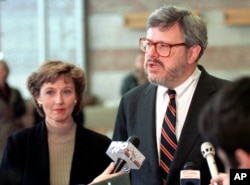The White House has directed all U.S. ambassadors who are political appointees to resign their posts as of Inauguration Day, January 20.
“That is common, typical practice,” State Department spokesman John Kirby said Friday, and he confirmed that ambassadors who are career members of the U.S. Foreign Service — about 70 percent of the top American envoys abroad — were not asked to offer their resignations.
“The politically appointed ambassadors are being pulled back because they are the representatives of the outgoing administration” of President Barack Obama, according to the president of the American Academy of Diplomacy, Ronald Neumann.
“When you are a political appointee for this or any other administration, you have no expectation of staying beyond the inauguration of the new administration,” Kirby said.
Trump ordered all out by Inauguration Day
In the background of this week’s developments, however, is the disclosure that President-elect Donald Trump’s transition staff issued a blanket order earlier, distributed as a diplomatic cable by the State Department, ordering all political appointees to leave their overseas posts by Inauguration Day.
The New York Times said the order appeared to break with decades of precedent by indicating that affected ambassadors would not get even the briefest extension of their appointments, for reasons such as completing a child’s school term or dealing with family health issues.
A senior member of Trump’s transition team told the Times there was no ill will in the move, describing it as a simple matter of ensuring that Obama’s overseas envoys leave the government on schedule, just as thousands of political aides at the White House and in federal agencies must do.
“The only thing that is different is that they are not letting any of them have extensions,” Neumann told VOA. “That is a little unusual.”
Very few noncareer ambassadors seek such extensions, and usually only on a short-term basis, Neumann added. The American Academy of Diplomacy that he heads is made up of former career and noncareer U.S. government officials who have served in international affairs.
Requests of extensions handled case by case
David Eagles, director of the Partnership for Public Service’s Center for Presidential Transition, agreed it is customary that all noncareer ambassadors submit their resignations when administrations change in Washington.
“Historically there have been exceptions,” he told VOA by email, “which have been dealt with on a case-by-case basis due to professional or personal reasons.”
A former U.S. ambassador to Romania, Jim Rosapepe, was appointed during the Clinton administration and resigned when the administration changed.
“A number of my colleagues — particularly in Europe, those who had children in schools — asked to be extended till the end of the school year. And the Bush administration had them stay until May or June, something like that,” he told VOA.
Veteran diplomats emphasized that the United States will not be left without envoys in charge of critical posts as the government changes hands later this month.
“All U.S. embassies will also typically have a No. 2 diplomat, known as the deputy chief of mission, who will take over as charge d’affaires — in essence, an ‘acting ambassador’ — in the absence of a Senate-confirmed replacement. Diplomacy continues and the work of our U.S. embassies goes on,” a former U.S. ambassador to the Asian Development Bank, Curtis S. Chin, told VOA Friday.
Chin served under presidents from both major U.S. political parties, Republican George W. Bush and Democrat Barack Obama. He is the inaugural Asia Fellow at the Milken Institute.
Rosapepe agreed that if a crisis erupts abroad, he is confident that “experienced and able” career diplomats are on hand to handle any situation.





